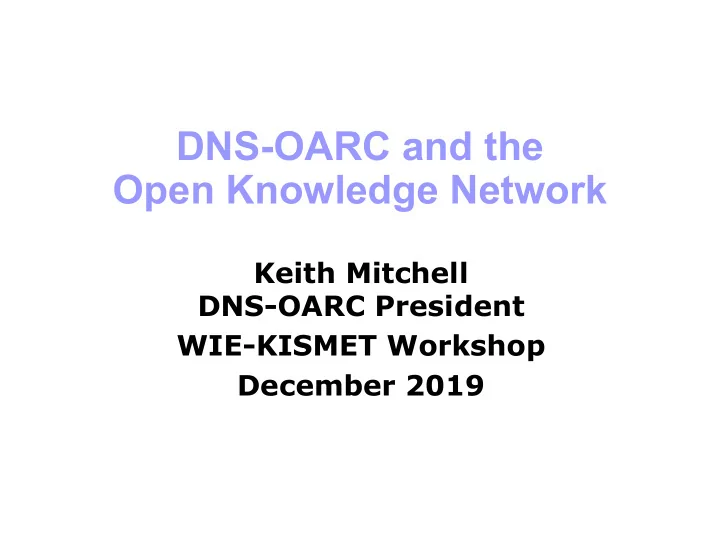

DNS-OARC and the Open Knowledge Network Keith Mitchell DNS-OARC President WIE-KISMET Workshop December 2019
OARC's Mission Statement The Domain Name System Operations Analysis and Research Center (DNS-OARC) is a non-profit, membership organization that seeks to improve the security, stability, and understanding of the Internet's DNS infrastructure. DNS-OARC's mission is to: promote and conduct research with operational relevance through data collection and analysis offer useful services and tools build relationships among its community of members facilitate an environment where information can be shared responsibly enable knowledge transfer by organizing open workshops increase public awareness of the DNS's significance
OARC Governance Project founded by CAIDA and ISC in 2004 Independent legal entity since 2008 Diverse ~100 member base Financially stable and self-supporting ~$800k annual revenue ~= expenses Self-governing, neutral Elected Board reflecting Member interests Contracted Executive Staff (~4 FTE) Volunteer workshop Programme Committee 501(c)3 non-profit public benefit corporation
What we provide to our Members and the Community ● DNS operational best-practice knowledge-sharing ● Development and maintenance of open-source DNS tools ● A range of online platforms and services to support the above ● DNS dataset collection, curation and sharing ● Collaboration venue between operators and researchers ● Workshops as a focus for all the above activities ● “Global DNSNOG”
2019 Achievements ● The new home for DNSVIZ, dnsperf & dnsmeter ● New Member portal website operational ● OARC30 Bangkok biggest workshop ever, jointly with ICANN IDS ● New releases of dsc-datatool , dnsjit and drool tools ● Awarded Community Grant by ARIN to support open-source software maintenance ● Major dataset file store stabilization effort ● Administrative support of DNS Flag Day
OARC Workshops ● 2 ½ workshops per year, 2 days long ● 150-200 attendees ● Co-location with RIPE/NANOG/ICANN meetings ● OARC33 ● OARC32 ● May 9-10 th 2020 ● Feb 8 th 2020 ● Paris, France ● San Francisco, CA ● Co-located with ICANN ● Co-located with IDS, GDD NANOG78
Operator/Researcher Collaboration ● Our Members are a diverse mixture of operators, researchers, vendors, developers ● Operators have more data than cycles.. ● Researchers have more cycles than data.. ● While our Membership model is a great arena for collaboration, the resources required for supporting dataset storage and analysis are disproportionately funded from commercial Members' fees compared to researcher usage
OARC's DNS Dataset 230Tb, most of this DITL collections since 2004 ● Other collections: ● ZFR, Root zone archive, DSC, tester logs, resolver capture ● Data is mostly raw capture: minimal curation, metadata or semantic ● attributes Dataset is stand-alone, restrictions on export from OARC means it ● must be analyzed in-situ Remains a key resource for a core cadre of regular researchers, ● historical perspective has proven invaluable at various points e.g. Name Collisions study ● Regular storage platform infrastructure upgrades have expanded raw ● storage with the dataset but have not updated or scaling processing capacity to keep pace ●
Storage Infrastructure Challenges We had various issues with this in 2019, and have been unable to ● post-process several recent DITL collections as a consequence Various non-upgraded elements have aged ● While we are keeping the dataset in a stable state, it’s burning ● scarce sysadmin resource to keep it that way The nature of OARC’s dataset and current use policies do not make ● it amenable or economic to do storage/analysis in a 3rd-party cloud The resource drain of gathering and maintaining DITL data is ● impairing OARC’s ability to do many other activities Preserving the status quo is not necessarily cheaper nor safer than a ● major upgrade programme
What we are Planning New Ceph-based scalable storage architecture proposal: ● https://indico.dns-oarc.net/event/32/contributions/736/attachments/702/1194/ ● Filesystem-Clustering.pdf with some bootstrap funding, running and growing this will be cheaper than our ● current infrastructure Surveying Members to identify resource needs and potential ● sources Seeking further funding to develop privacy-aware DNS tools ● Enhancements to DNSVIZ ● Board committee has been formed to update privacy policy: ● meet post-Snowden/GDPR challenges ● ideally enable use of cloud-based resources ●
What we would like to do ● Store our dataset in some kind of database to enable easier and more meaningful analysis ● Facilitate ongoing processing of new and existing data in ways that respect modern privacy models ● Restore realtime DNS telemetry sharing e.g. DSC-Grafana ● ● Continue to facilitate equitable 2-way data ↔ knowledge sharing between operators and researchers ● Be a co-operative building block in a wider data sharing/analysis ecosystem
Questions/Discussion
Recommend
More recommend